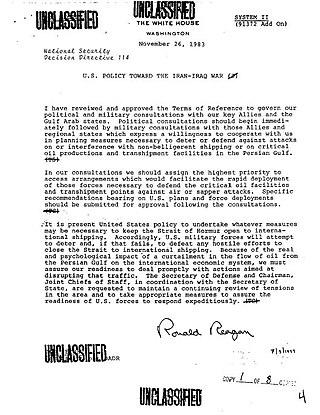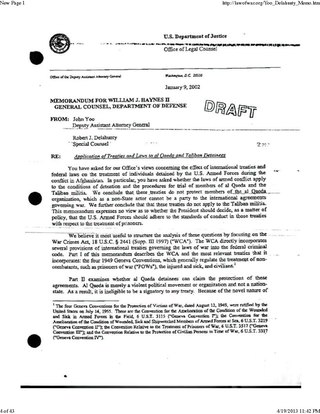
The Freedom of Information Act, 5 U.S.C. § 552, is the United States federal freedom of information law that requires the full or partial disclosure of previously unreleased or uncirculated information and documents controlled by the U.S. government upon request. The act defines agency records subject to disclosure, outlines mandatory disclosure procedures, and includes nine exemptions that define categories of information not subject to disclosure. The act was intended to make U.S. government agencies' functions more transparent so that the American public could more easily identify problems in government functioning and put pressure on Congress, agency officials, and the president to address them. The FOIA has been changed repeatedly by both the legislative and executive branches.

National security directives are presidential directives issued for the National Security Council (NSC). Starting with Harry Truman, every president since the founding of the National Security Council in 1947 has issued national security directives in one form or another, which have involved foreign, military and domestic policies. National security directives are generally highly classified and are available to the public only after "a great many years" have elapsed. Unlike executive orders, national security directives are usually directed only to the National Security Council and the most senior executive branch officials, and embody foreign and military policy-making guidance rather than specific instructions.

The United States President's Commission on CIA Activities within the United States was ordained by President Gerald Ford in 1975 to investigate the activities of the Central Intelligence Agency and other intelligence agencies within the United States. The Presidential Commission was led by Vice President Nelson Rockefeller, from whom it gained the nickname the Rockefeller Commission.

The Watergate scandal refers to the burglary and illegal wiretapping of the headquarters of the Democratic National Committee, in the Watergate complex by members of President Richard Nixon's re-election campaign, and the subsequent cover-up of the break-in resulting in Nixon's resignation on August 9, 1974, as well as other abuses of power by the Nixon White House that were discovered during the course of the scandal.

The 2nd G7 Summit, also called Rambouillet II, was held at Dorado, Puerto Rico, between June 27 and 28, 1976. The venue for the summit meetings was the Dorado Beach Hotel, now Dorado Beach Resort, which is near San Juan, Puerto Rico.
A presidential memorandum is a type of directive issued by the president of the United States to manage and govern the actions, practices, and policies of the various departments and agencies found under the executive branch of the United States government. It has the force of law and is usually used to delegate tasks, direct specific government agencies to do something, or to start a regulatory process. There are three types of presidential memoranda: presidential determination or presidential finding, memorandum of disapproval, and hortatory memorandum.

A set of legal memoranda known as the "Torture Memos" were drafted by John Yoo as Deputy Assistant Attorney General of the United States and signed in August 2002 by Assistant Attorney General Jay S. Bybee, head of the Office of Legal Counsel of the United States Department of Justice. They advised the Central Intelligence Agency, the United States Department of Defense, and the President on the use of enhanced interrogation techniques—mental and physical torment and coercion such as prolonged sleep deprivation, binding in stress positions, and waterboarding—and stated that such acts, widely regarded as torture, might be legally permissible under an expansive interpretation of presidential authority during the "War on Terror".
Executive orders are issued to help officers and agencies of the executive branch manage the operations within the federal government itself. Presidential memoranda are closely related, and have the force of law on the Executive Branch, but are generally considered less prestigious. Presidential memoranda do not have an established process for issuance, and unlike executive orders, they are not numbered. A presidential determination is a determination resulting in an official policy or position of the executive branch of the United States government. A presidential proclamation is a statement issued by a president on a matter of public policy issued under specific authority granted to the president by Congress and typically on a matter of widespread interest. Administrative orders are signed documents such as notices, letters, and orders that can be issued to conduct administrative operations of the federal government. A presidential notice or a presidential sequestration order can also be issued. National security directives1 operate like executive orders, but are only in the area of national security. They have been issued by different presidents under various names.
Presidential Emergency Action Documents (PEADs) are draft classified executive orders, proclamations, and messages to Congress that are prepared for the President of the United States to exercise or expand powers in anticipation of a range of emergency hypothetical worst-case scenarios, so that they are ready to sign and put into effect the moment one of those scenarios comes to pass. They are defined by the Federal Emergency Management Agency as the "Final drafts of Presidential messages, proposed legislation proclamations, and other formal documents, including DOJ-issued cover sheets addressed to the President, to be issued in event of a Presidentially-declared national emergency."






